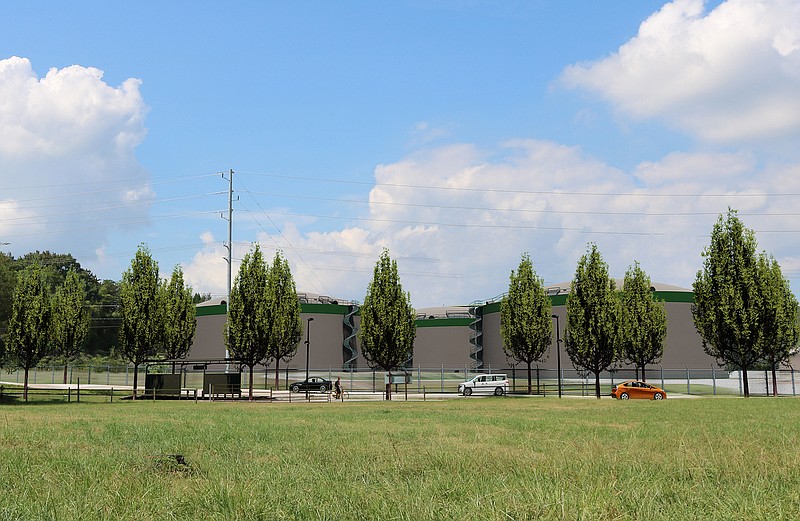The biggest single spending item yet in Chattanooga's ongoing sewage treatment cleanup is coming up for a vote in the city council.
The $46.5 million project aims to dry up what's known as the West Bank Outfall, where millions of gallons of sewage has spilled into the Tennessee River when heavy rains overwhelm the Moccasin Bend Sewage Treatment Plant.
Plans call for three 10-million-gallon storage tanks, or "equalization stations," on Hamm Road near the plant. In wet weather, those giant structures - each around 55 feet tall and 195 feet in circumference - will collect and store water and waste until it can be treated and discharged properly into the river. The total capacity of 30 million gallons is a bit less than half a normal day's load for the plant.
Chattanooga council members will vote Feb. 5 whether to award the construction contract to Reeves Young LLC, of Sugar Hill, Georgia. With a $2 million contingency amount for unexpected expenses, the contract totals $48,569,100.
The city has a deadline of July 2020 to stop spills at the West Bank Outfall, part of the consent decree it signed in 2013 with the U.S. Department of Justice and federal and state environmental regulators to stop violating the Clean Water Act.
"It is doable. It's a pretty tight time frame, but it's doable," Chattanooga Public Works Director Justin Holland said.
"There could be times when just huge floodwaters come [and the tanks] may get full, but we're designing it to take everything that comes down that pipe" to the Moccasin Bend treatment plant, Holland added.
The West Bank Outfall is located right about where the visitor center for the Moccasin Bend National Archeological District eventually will be located.
The city's wastewater treatment plant takes in waste from 400,000 customers in Chattanooga and eight neighboring communities. Parts of the system date back to the city's earliest days, and over time what's supposed to be a sealed system has opened up leaks and cracks.
In wet weather those leaks and cracks admit rainwater runoff that spews up through manholes or spills over at outfalls, dumping waste-contaminated water onto streets and yards, creeks and the river from which Chattanooga residents drink.
And Chattanoogans saw plenty of wet weather last year. The city reported almost 66 inches, compared to the yearly average of 52.48.
A lot of that rain went into the sewer system. Just between July 1 and Sept. 30, Chattanooga reported 43 sewer overflows and 60 outfall discharges totaling tens of millions of gallons to the U.S. Environmental Protection Agency.
To date, the city has budgeted $264 million to find and fix leaking sewer lines, update and add capacity at the sewage treatment plant and build tanks to hold runoff. Of 86 planned projects in Phase I, 53 are complete and 15 are under construction, and sewage overflows have fallen by an average of 17 percent a year since 2013, city records show.
Jeffrey Rose, director of waste resources, said the equalization stations will be made of prestressed concrete and capped by domes.
They will be built on concrete slabs and odor control measures will be included along with landscaping. An image of the project from Public Works shows tan-painted structures with green accents, but Public Works spokeswoman Colline Ferrier said that could change.
Holland and Rose said late last year that plans call for perhaps as many as eight such holding structures in areas of the city plagued by sewage overflows.
The exact locations haven't been chosen yet, Holland said Thursday.
"We know where our problems are; we don't know where the solutions are yet," Holland said.
As those plans develop, home and business owners in the area will have plenty of notice, Rose said.
"We'll be doing public input sessions for all our projects," he said. "We want to make sure the community has the opportunity to ask questions and to inform them on what's happening and what they should expect."
People in the unincorporated parts of Hamilton County also are likely to see similar holding tanks sprouting as the county's Water and Wastewater Treatment Authority prepares to sign its own consent decree to remedy Clean Water Act violations.
Hamilton County commissioners in December voted to deny a special permit for the WWTA to build its own sewage treatment plant on Mahan Gap Road.
The utility now ships waste from the unincorporated county and its member cities to Moccasin Bend. Utility officials had said a new treatment plant would increase sewer capacity in the northern part of the county, opening it up for development, and help it comply with the consent decree.
But homeowners in the area vehemently opposed the plant, fearing it would endanger their health, their home values, their quality of life and the environment.
Since then, the WWTA has said it will work to enlarge its capacity to ship waste to Moccasin Bend, including building wet-weather holding tanks at multiple locations including Mahan Gap Road.
Contact staff writer Judy Walton at jwalton@timesfreepress.com or 423-757-6416.
